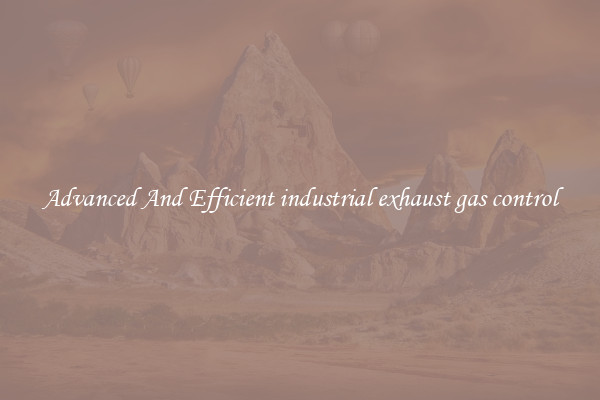Advanced And Efficient industrial exhaust gas control
In today's industrial era, controlling exhaust gases has become a crucial aspect of ensuring a sustainable and eco-friendly environment. Advanced and efficient industrial exhaust gas control technologies have emerged as effective solutions to mitigate the harmful effects of exhaust emissions.

Industrial exhaust gases, which contain pollutants such as nitrogen oxides (NOx), sulfur oxides (SOx), carbon monoxide (CO), and particulate matter (PM), pose significant risks to human health and the environment. These pollutants contribute to air pollution, climate change, and respiratory diseases. Therefore, it is imperative to develop and implement effective control measures to minimize their release into the atmosphere.
One of the most commonly employed techniques for industrial exhaust gas control is the use of pollution control devices such as scrubbers, electrostatic precipitators, and catalytic converters. These devices remove or convert the harmful gases and particulate matter before they are released into the air. Scrubbers, for instance, use a solution to trap and neutralize pollutants, while catalytic converters use catalysts to convert toxic gases into less harmful substances.
Another advanced technology used in industrial exhaust gas control is selective catalytic reduction (SCR). SCR systems employ a catalyst to convert nitrogen oxides into nitrogen and water vapor by reacting them with a reducing agent, usually ammonia or urea. This technique is highly efficient in reducing NOx emissions, making it a popular choice in power plants and heavy industries.
Moreover, advancements in monitoring and control systems have made exhaust gas control more efficient and automated. Real-time monitoring of emissions allows industries to detect and address any irregularities promptly. Additionally, the integration of control systems with artificial intelligence and machine learning algorithms enable continuous optimization of exhaust gas control processes, ensuring minimal release of pollutants.
Furthermore, industries are increasingly adopting alternative energy sources, such as solar power and wind energy, to reduce their dependence on fossil fuels. This transition to cleaner energy sources significantly reduces exhaust gas emissions from industrial operations.
Overall, advanced and efficient industrial exhaust gas control technologies play a vital role in curbing pollution and promoting sustainable development. These technologies not only help industries comply with stringent environmental regulations but also contribute to the well-being of society as a whole. Continued research and development in this field are essential to further improve the effectiveness and efficiency of exhaust gas control measures. Embracing these technologies will foster a cleaner and healthier environment for future generations.

View details

View details

View details

View details







